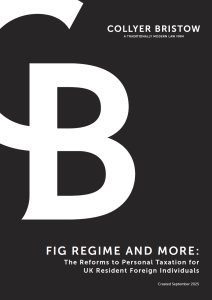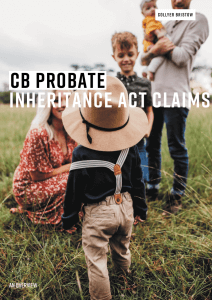
The Team
Our lawyers have the expertise and experience to provide you with creative, personalised solutions in a clear and understandable way.
Our Publications
Discover a wealth of invaluable guidance in the form of guides and brochures written by our expert lawyers.
Our insights
Discover the latest insights and thought leadership from our team of legal experts.
About
What is proprietary estoppel?
If you have been promised property by a person who died but the promise was not reflected in their will, then you can ask your solicitor to make a claim in proprietary estoppel. If successful, a court may order that the promise should be upheld. Proprietary estoppel is an equitable claim meaning it is based on fairness and justice. Related equitable claims include those for a declaration or finding of a constructive or resulting trust in favour of the claimant.
Proprietary estoppel is a claim to enforce a broken promise. It can be used to challenge a will if you have grounds to believe that the deceased made a promise before their death, such as a promise to transfer property or land, but did not subsequently fulfil the promise in their will.
These claims often involve agricultural property. For example, suppose that a father promises his son that he will leave him the family farm when the father dies. Relying on that promise, the son works long hours on the farm with minimal pay. If the father does not leave the farm to his son in his will, his son could have an estoppel claim against his father’s estate.
How do you prove that a promise was broken?
It is not enough to prove that someone made a promise to you before they died. You must also show that you relied on the promise to your detriment or suffered some kind of loss, such as investing money in a property you thought you would inherit.
The court will look at various factors when deciding if a promise was made and broken, including:
- The length of time between when the promise was made and when it was broken
- Whether or not the deceased was in a position to make the promise and, crucially
- Whether it would be unfair or unjust to go back on the promise.
What happens if you are successful?
If your claim is successful, then the court may order that the promise should be upheld. This could mean that you receive a share of the estate or transfer of a property, or that you receive payment from the estate for any money you have invested in reliance on the promise.
It is important to seek legal advice about your rights if you believe someone has broken a promise made before they died. Your solicitor will be able to assess the strength of your claim and advise you on how best to proceed.
Constructive and resulting trusts in estate disputes
As well as claims to enforce broken promises (proprietary estoppel), it may be possible to bring a constructive trust or resulting trust claim against the estate to achieve fairness.
A resulting trust arises where the deceased owned a property or another asset such as a car, but the true owner of all or part of the asset is the claimant, as the claimant contributed to the purchase of the asset. The court will presume that a resulting trust exists unless there is evidence that the claimant intended to make a gift or loan of the asset to the deceased. Resulting trusts often are straightforward to establish because there is a clear financial trail.
A constructive trust is similar but more complex. It arises when the intention of the parties is not reflected in the legal ownership of an asset. For example, a constructive trust can arise if X buys the family home in their sole name but Y pays the mortgage and spends a significant amount of money on renovating the house. Y may be able to claim a share of the home on X’s death as otherwise, they would be unjustly deprived and X (or X’s estate) would be unjustly enriched.
Death bed gifts
Under this principle, also known as ‘donatio mortis causa’, it is possible for a person, ‘on their deathbed’, to make a gift of their property to another individual without adhering to the usual requirements of wills and property law. For such gifts to be valid, certain conditions must be met: the gift must be made in contemplation of the donor’s impending death and there must be actual delivery of the gifted property. If achieved, the gift will take place immediately on the death of the donor and the property will not pass through their estate. Because such gifts avoid the normal formalities usually required for succession, they are often challenged by the PR’s or other beneficiaries of the donor’s estate and may need to be defended accordingly.
How we can help
Our team of specialist solicitors has extensive experience in dealing with contentious probate disputes. We understand how complex and emotive these matters can be and are committed to ensuring that our clients get the best possible outcome. To arrange a confidential consultation, please get in touch today.
Francis MerrittChartered Legal Executive
+44 20 7470 4529 +44 7947 532112francis.merritt@collyerbristow.com
Spotlight
Challenging a will
Where a will does not accurately reflect the deceased’s wishes, or where there are question marks over how a will was made, we advise clients as to the available options to challenge the will. Circumstances may include an invalidly executed will, fraud or forgery, undue influence, and the testator lacking the requisite testamentary capacity to make a will. We can act in bringing or defending challenges of this type.
Spotlight
Claiming under the Inheritance Act 1975
Certain categories of person can make a claim under the Inheritance (Provision for Family and Dependants) Act 1975 to seek an order for reasonable financial provision from a person’s estate when they have not been left anything under the will. We have experience of acting for both claimants and defendants in these cases.
Spotlight
Disputes with trustees
Beneficiaries sometimes feel that trustees are not complying or fulfilling their duties properly. Such disagreements range from the inadequate provision of information to more fundamental negligence and breach of trust claims. We act for both trustees and beneficiaries in resolving these disputes when they arise.
Equitable Claims to Property Publications
FIG Regime and more: The Reforms to Personal Taxation for UK Resident Foreign IndividualsWhat the new rules mean for UK resident foreign taxpayers - What the new rules mean for UK resident foreign taxpayers
From 6 April 2025, UK tax for foreign residents is based solely on tax residence, not domicile. The simplified system affects income, capital gains, and inheritance tax, offering some residents up to four years to shelter non-UK income and gains.
Inheritance Act Claims:An overview - An overview
If a deceased’s Will fails to make adequate provision for someone who falls within certain categories, the Inheritance Act 1975 may permit them to successfully claim part of the deceased’s estate. This guide explains more.
Equitable Claims to Property insights
Shorter Reads
2025 Spring Statement2025 Spring Statement
Read more
Shorter Reads
Why should families take heed of the Alain Delon inheritance dispute?Why should families take heed of the Alain Delon inheritance dispute?
Read more
Longer Reads
Can I prove my sister’s financial abuse?Can I prove my sister’s financial abuse?
Read more
Longer Reads
How English courts deal with gender discrimination in inheritance disputesHow English courts deal with gender discrimination in inheritance disputes
Read more
Shorter Reads
A promise of inheritance has been withdrawn. Can I claim against my parents?A promise of inheritance has been withdrawn. Can I claim against my parents?
Read more
Longer Reads
Disputes over the proper administration of trusts and estatesDisputes over the proper administration of trusts and estates
Read more
News
New Partner hire for Collyer Bristow’s Tax and Estate Planning teamNew Partner hire for Collyer Bristow’s Tax and Estate Planning team
Read more
Shorter Reads
Can my half-sister challenge our father’s will?Can my half-sister challenge our father’s will?
Read more
You might also like
Need some more information? Make an enquiry below
Equitable Claims to Property key contacts
- Samara
DuttonPartner
Talk to Samara about Trusts & Inheritance disputes and Private wealth
Equitable Claims to Property
Where the deceased made express or implied promises or assurances to pass specific property or belongings to an individual, but failed to record those promises in their Will, it may still be possible for the individual to receive the items in question, based on equitable principles.
The Team
Our lawyers have the expertise and experience to provide you with creative, personalised solutions in a clear and understandable way.
Our Publications
Discover a wealth of invaluable guidance in the form of guides and brochures written by our expert lawyers.
Our insights
Discover the latest insights and thought leadership from our team of legal experts.
What is proprietary estoppel?
If you have been promised property by a person who died but the promise was not reflected in their will, then you can ask your solicitor to make a claim in proprietary estoppel. If successful, a court may order that the promise should be upheld. Proprietary estoppel is an equitable claim meaning it is based on fairness and justice. Related equitable claims include those for a declaration or finding of a constructive or resulting trust in favour of the claimant.
Proprietary estoppel is a claim to enforce a broken promise. It can be used to challenge a will if you have grounds to believe that the deceased made a promise before their death, such as a promise to transfer property or land, but did not subsequently fulfil the promise in their will.
These claims often involve agricultural property. For example, suppose that a father promises his son that he will leave him the family farm when the father dies. Relying on that promise, the son works long hours on the farm with minimal pay. If the father does not leave the farm to his son in his will, his son could have an estoppel claim against his father’s estate.
How do you prove that a promise was broken?
It is not enough to prove that someone made a promise to you before they died. You must also show that you relied on the promise to your detriment or suffered some kind of loss, such as investing money in a property you thought you would inherit.
The court will look at various factors when deciding if a promise was made and broken, including:
- The length of time between when the promise was made and when it was broken
- Whether or not the deceased was in a position to make the promise and, crucially
- Whether it would be unfair or unjust to go back on the promise.
What happens if you are successful?
If your claim is successful, then the court may order that the promise should be upheld. This could mean that you receive a share of the estate or transfer of a property, or that you receive payment from the estate for any money you have invested in reliance on the promise.
It is important to seek legal advice about your rights if you believe someone has broken a promise made before they died. Your solicitor will be able to assess the strength of your claim and advise you on how best to proceed.
Constructive and resulting trusts in estate disputes
As well as claims to enforce broken promises (proprietary estoppel), it may be possible to bring a constructive trust or resulting trust claim against the estate to achieve fairness.
A resulting trust arises where the deceased owned a property or another asset such as a car, but the true owner of all or part of the asset is the claimant, as the claimant contributed to the purchase of the asset. The court will presume that a resulting trust exists unless there is evidence that the claimant intended to make a gift or loan of the asset to the deceased. Resulting trusts often are straightforward to establish because there is a clear financial trail.
A constructive trust is similar but more complex. It arises when the intention of the parties is not reflected in the legal ownership of an asset. For example, a constructive trust can arise if X buys the family home in their sole name but Y pays the mortgage and spends a significant amount of money on renovating the house. Y may be able to claim a share of the home on X’s death as otherwise, they would be unjustly deprived and X (or X’s estate) would be unjustly enriched.
Death bed gifts
Under this principle, also known as ‘donatio mortis causa’, it is possible for a person, ‘on their deathbed’, to make a gift of their property to another individual without adhering to the usual requirements of wills and property law. For such gifts to be valid, certain conditions must be met: the gift must be made in contemplation of the donor’s impending death and there must be actual delivery of the gifted property. If achieved, the gift will take place immediately on the death of the donor and the property will not pass through their estate. Because such gifts avoid the normal formalities usually required for succession, they are often challenged by the PR’s or other beneficiaries of the donor’s estate and may need to be defended accordingly.
How we can help
Our team of specialist solicitors has extensive experience in dealing with contentious probate disputes. We understand how complex and emotive these matters can be and are committed to ensuring that our clients get the best possible outcome. To arrange a confidential consultation, please get in touch today.
Samara DuttonPartner
View Samara Dutton's profileAbbie ColemanAssociate
View Abbie Coleman's profileCarly RussellPartner
View Carly Russell's profileFrancis MerrittChartered Legal Executive
View Francis Merritt's profileJames AustenPartner
View James Austen's profilePeter PrattSenior Associate
View Peter Pratt's profileSPOTLIGHT
Challenging a willopen
Where a will does not accurately reflect the deceased’s wishes, or where there are question marks over how a will was made, we advise clients as to the available options to challenge the will. Circumstances may include an invalidly executed will, fraud or forgery, undue influence, and the testator lacking the requisite testamentary capacity to make a will. We can act in bringing or defending challenges of this type.
Claiming under the Inheritance Act 1975open
Certain categories of person can make a claim under the Inheritance (Provision for Family and Dependants) Act 1975 to seek an order for reasonable financial provision from a person’s estate when they have not been left anything under the will. We have experience of acting for both claimants and defendants in these cases.
Disputes with trusteesopen
Beneficiaries sometimes feel that trustees are not complying or fulfilling their duties properly. Such disagreements range from the inadequate provision of information to more fundamental negligence and breach of trust claims. We act for both trustees and beneficiaries in resolving these disputes when they arise.
Equitable Claims to Property Publications
Equitable Claims to Property insights
Shorter Reads
2025 Spring Statement2025 Spring Statement
Read more
Shorter Reads
Why should families take heed of the Alain Delon inheritance dispute?Why should families take heed of the Alain Delon inheritance dispute?
Read more
Longer Reads
Can I prove my sister’s financial abuse?Can I prove my sister’s financial abuse?
Read more
Longer Reads
How English courts deal with gender discrimination in inheritance disputesHow English courts deal with gender discrimination in inheritance disputes
Read more
Shorter Reads
A promise of inheritance has been withdrawn. Can I claim against my parents?A promise of inheritance has been withdrawn. Can I claim against my parents?
Read more
Longer Reads
Disputes over the proper administration of trusts and estatesDisputes over the proper administration of trusts and estates
Read more
News
New Partner hire for Collyer Bristow’s Tax and Estate Planning teamNew Partner hire for Collyer Bristow’s Tax and Estate Planning team
Read more
Shorter Reads
Can my half-sister challenge our father’s will?Can my half-sister challenge our father’s will?
Read more
Need some more information? Make an enquiry below.
Message us on WhatsApp (calling not available)
Please note that Collyer Bristow provides this service during office hours for general information and enquiries only and that no legal or other professional advice will be provided over the WhatsApp platform. Please also note that if you choose to use this platform your personal data is likely to be processed outside the UK and EEA, including in the US. Appropriate legal or other professional opinion should be taken before taking or omitting to take any action in respect of any specific problem. Collyer Bristow LLP accepts no liability for any loss or damage which may arise from reliance on information provided. All information will be deleted immediately upon completion of a conversation.
Close


























